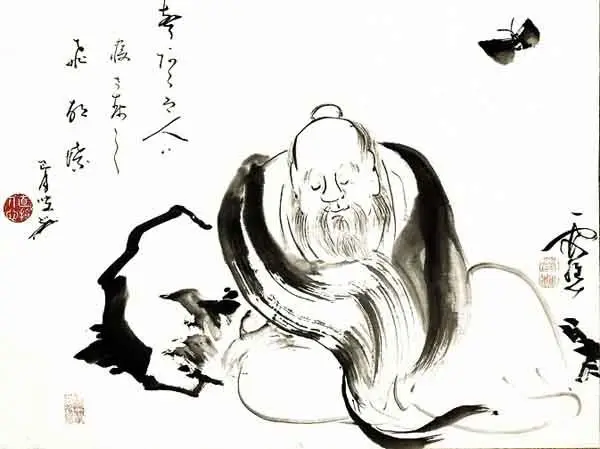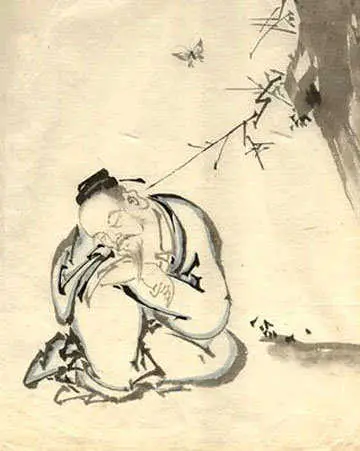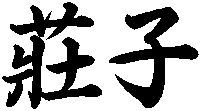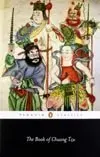|
Tao Te Ching
THE TAOISM OF LAO TZU
|
Chuang Tzu 11 The Taoist Text, Chapter 11
Letting Be, and Exercising Forbearance.1. I have heard of letting the world be, and exercising forbearance; I have not heard of governing the world. Letting be is from the fear that men, (when interfered with), will carry their nature beyond its normal condition; exercising forbearance is from the fear that men, (when not so dealt with), will alter the characteristics of their nature. When all men do not carry their nature beyond its normal condition, nor alter its characteristics, the good government of the world is secured.
Formerly, Yâo's government of the world made men look joyful; but when they have this joy in their nature, there is a want of its (proper) placidity. The government of the world by Kieh, (on the contrary), made men look distressed; but when their nature shows the symptoms of distress, there is a want of its (proper) contentment. The want of placidity and the want of contentment are contrary to the character (of the nature); and where this obtains, it is impossible that any man or state should anywhere abide long. Are men exceedingly joyful?- the Yang or element of expansion in them is too much developed. Are they exceedingly irritated?- the Yin or opposite element is too much developed. When those elements thus predominate in men, (it is as if) the four seasons were not to come (at their proper times), and the harmony of cold and heat were not to be maintained;- would there not result injury to the bodies of men? Men's joy and dissatisfaction are made to arise where they ought not to do so; their movements are all uncertain; they lose the mastery of their thoughts; they stop short midway, and do not finish what they have begun. In this state of things the world begins to have lofty aims, and jealous dislikes, ambitious courses, and fierce animosities, and then we have actions like those of the robber Kih, or of Tsang (Shan) and Shih (Tshiû). If now the whole world were taken to reward the good it would not suffice, nor would it be possible with it to punish the bad. Thus the world, great as it is, not sufficing for rewards and punishments, from the time of the three dynasties downwards, there has been nothing but bustle and excitement. Always occupied with rewards and punishments, what leisure have men had to rest in the instincts of the nature with which they are endowed?
Anciently, Hwang-Tì was the first to meddle with and disturb the mind of man with his benevolence and righteousness. After him, Yâo and Shun wore their thighs bare and the hair off the calves of their legs, in their labours to nourish the bodies of the people. They toiled painfully with all the powers in their five viscera at the practice of their benevolence and righteousness; they tasked their blood and breath to make out a code of laws;- and after all they were unsuccessful. On this Yâo sent away Hwan Tâu to Khung hill, and (the Chiefs of) the Three Miâo to San-wei, and banished the Minister of Works to the Dark Capital; so unequal had they been to cope with the world. Then we are carried on to the kings of the Three (dynasties), when the world was in a state of great distraction. Of the lowest type of character there were Kieh and Kih; of a higher type there were Tsang (Shan) and Shih (Tshiû). At the same time there arose the classes of the Literati and the Mohists. Hereupon, complacency in, and hatred of, one another produced mutual suspicions; the stupid and the wise imposed on one another; the good and the bad condemned one another; the boastful and the sincere interchanged their recriminations;- and the world fell into decay. Views as to what was greatly virtuous did not agree, and the nature with its endowments became as if shrivelled by fire or carried away by a flood. All were eager for knowledge, and the people were exhausted with their searchings (after what was good). On this the axe and the saw were brought into play; guilt was determined as by the plumb-line and death inflicted; the hammer and gouge did their work. The world fell into great disorder, and presented the appearance of a jagged mountain ridge. The crime to which all was due was the meddling with and disturbing men's minds. The effect was that men of ability and worth lay concealed at the foot of the crags of mount Thâi, and princes of ten thousand chariots were anxious and terrified in their ancestral temples. In the present age those who have been put to death in various ways lie thick as if pillowed on each other; those who are wearing the cangue press on each other (on the roads); those who are suffering the bastinado can see each other (all over the land). And now the Literati and the Mohists begin to stand, on tiptoe and with bare arms, among the fettered and manacled crowd! Ah! extreme is their shamelessness, and their failure to see the disgrace! Strange that we should be slow to recognise their sageness and wisdom in the bars of the cangue, and their benevolence and righteousness in the rivets of the fetters and handcuffs! How do we know that Tsang and Shih are not the whizzing arrows of Kieh and Kih? Therefore it is said, "Abolish sageness and cast away knowledge, and the world will be brought to a state of great order."
Hwang-Tì withdrew, gave up (his government of) the kingdom, built himself a solitary apartment, spread in it a mat of the white mâo grass, dwelt in it unoccupied for three months, and then went again to seek an interview with (the recluse). Kwang Khang-tsze was then lying down with his head to the south. Hwang-Tì, with an air of deferential submission, went forward on his knees, twice bowed low with his face to the ground, and asked him, saying, "I have heard that you, Sir, are well acquainted with the perfect Tâo;- I venture to ask how I should rule my body, in order that it may continue for a long time." Kwang Khang-tsze hastily rose, and said, "A good question! Come and I will tell you the perfect Tâo. Its essence is (surrounded with) the deepest obscurity; its highest reach is in darkness and silence. There is nothing to be seen; nothing to be heard. When it holds the spirit in its arms in stillness, then the bodily form of itself will become correct. You must be still; you must be pure; not subjecting your body to toil, not agitating your vital force;- then you may live for long. When your eyes see nothing, your ears hear nothing, and your mind knows nothing, your spirit will keep your body, and the body will live long. Watch over what is within you, shut up the avenues that connect you with what is external;- much knowledge is pernicious. I (will) proceed with you to the summit of the Grand Brilliance, where we come to the source of the bright and expanding (element); I will enter with you the gate of the Deepest Obscurity, where we come to the source of the dark and repressing (element). There heaven and earth have their controllers; there the Yin and Yang have their Repositories. Watch over and keep your body, and all things will of themselves give it vigour. I maintain the (original) unity (of these elements), and dwell in the harmony of them. In this way I have cultivated myself for one thousand and two hundred years, and my bodily form has undergone no decay." Hwang-Tì twice bowed low with his head to the ground, and said, "In Kwang Khang-tsze we have an example of what is called Heaven." The other said, "Come, and I will tell you:- (The perfect Tâo) is something inexhaustible, and yet men all think it has an end; it is something unfathomable, and yet men all think its extreme limit can be reached. He who attains to my Tâo, if he be in a high position, will be one of the August ones, and in a low position, will be a king. He who fails in attaining it, in his highest attainment will see the light, but will descend and be of the Earth. At present all things are produced from the Earth and return to the Earth. Therefore I will leave you, and enter the gate of the Unending, to enjoy myself in the fields of the Illimitable. I will blend my light with that of the sun and moon, and will endure while heaven and earth endure. If men agree with my views, I will be unconscious of it; if they keep far apart from them, I will be unconscious of it; they may all die, and I will abide alone!"
Yün Kiang could not pursue his question; but three years afterwards, when (again) rambling in the east, as he was passing by the wild of Sung, he happened to meet Hung Mung. Delighted with the rencontre, he hastened to him, and said, "Have you forgotten me, 0 Heaven? Have you forgotten me, 0 Heaven?" At the same time, he bowed twice with his head to the ground, wishing to receive his instructions. Hung Mung said, "Wandering listlessly about, I know not what I seek; carried on by a wild impulse, I know not where I am going. I wander about in the strange manner (which you have seen), and see that nothing proceeds without method and order;- what more should I know?" Yün Kiang replied, "I also seem carried on by an aimless influence, and yet the people follow me wherever I go. I cannot help their doing so. But now as they thus imitate me, I wish to hear a word from you (in the case)." The other said, "What disturbs the regular method of Heaven, comes into collision with the nature of things, prevents the accomplishment of the mysterious (operation of) Heaven, scatters the herds of animals, makes the birds all sing at night, is calamitous to vegetation, and disastrous to all insects;- all this is owing, I conceive, to the error of governing men." "What then," said Yün Kiang, "shall I do?" "Ah," said the other, "you will only injure them! I will leave you in my dancing way, and return to my place." Yün Kiang rejoined, "It has been a difficult thing to get this meeting with you, 0 Heaven! I should like to hear from you a word (more)." Hung Mung said, "Ah! your mind (needs to be) nourished. Do you only take the position of doing nothing, and things will of themselves become transformed. Neglect your body; cast out from you your power of hearing and sight; forget what you have in common with things; cultivate a grand similarity with the chaos of the plastic ether; unloose your mind; set your spirit free; be still as if you had no soul. Of all the multitude of things every one returns to its root. Every one returns to its root, and does not know (that it is doing so). They all are as in the state of chaos, and during all their existence they do not leave it. If they knew (that they were returning to their root), they would be (consciously) leaving it. They do not ask its name; they do not seek to spy out their nature; and thus it is that things come to life of themselves." Yün Kiang said, "Heaven, you have conferred on me (the knowledge of) your operation, and revealed to me the mystery of it. All my life I had been seeking for it, and now I have obtained it." He then bowed twice, with his head to the ground, arose, took his leave, and walked away.
The teaching of (this) great man goes forth as the shadow from the substance, as the echo responds to the sound. When questioned, he responds, exhausting (from his own stores) all that is in the (enquirer's) mind, as if front to front with all under heaven. His resting-place gives forth no sound; his sphere of activity has no restriction of place, He conducts every one to his proper goal, proceeding to it and bringing him back to it as by his own movement. His movements have no trace; his going forth and his re-enterings have no deviation; his course is like that of the sun without beginning (or ending). If you would praise or discourse about his personality, he is united with the great community of existences. He belongs to that great community, and has no individual self. Having no individual self, how should he have anything that can be called his? If you look at those who have what they call their own, they are the superior men of former times; if you look at him who has nothing of the kind, he is the friend of heaven and earth.
Therefore the sages contemplated Heaven, but did not assist It. They tried to perfect their virtue, but did not allow it to embarrass them. They proceeded according to the Tâo, but did not lay any plans. They associated benevolence (with all their doings), but did not rely on it. They pursued righteousness extensively, but did not try to accumulate it. They responded to ceremonies, but did not conceal (their opinion as to the troublesomeness of them). They engaged in affairs as they occurred, and did not decline them. They strove to render their laws uniform, but (feared that confusion) might arise from them. They relied upon the people, and did not set light by them. They depended on things as their instruments, and did not discard them. They did not think things equal to what they employed them for, but yet they did not see that they could do without employing them. Those who do not understand Heaven are not pure in their virtue. Those who do not comprehend the Tâo have no course which they can pursue successfully. Alas for them who do not clearly understand the Tâo!
What is it that we call the Tâo? There is the Tâo, or Way of Heaven; and there is the Tâo, or Way of Man. Doing nothing and yet attracting all honour is the Way of Heaven; Doing and being embarrassed thereby is the Way of Man. It is the Way of Heaven that plays the part of the Lord; it is the Way of Man that plays the part of the Servant. The Way of Heaven and the Way of Man are far apart. They should be clearly distinguished from each other. 
Chuang Tzu
 The Book of Chuang TzuA modern translation of Chuang Tzu, by Martin Palmer and Elizabeth Breuilly.See the book at Amazon
About CookiesMy Other Websites:I Ching OnlineThe 64 hexagrams of the Chinese classic I Ching and what they mean in divination. Try it online for free.
Qi Energy ExercisesThe ancient Chinese life energy qi (chi) explained, with simple instructions on how to exercise it.
Life EnergyThe many ancient and modern life force beliefs all over the world explained and compared.
Taoismen på svenska
Other Books by Stefan StenuddClick the image to see the book at Amazon (paid link).
The Greek philosophers and what they thought about cosmology, myth, and the gods. |
 Tao Te Ching
Tao Te Ching Tao Quotes
Tao Quotes Fake Lao Tzu Quotes
Fake Lao Tzu Quotes Cosmos of the Ancients
Cosmos of the Ancients Qi — Increase Your Life Energy
Qi — Increase Your Life Energy Aikido Principles
Aikido Principles Life Energy Encyclopedia
Life Energy Encyclopedia Archetypes of Mythology
Archetypes of Mythology Stefan Stenudd
Stefan Stenudd